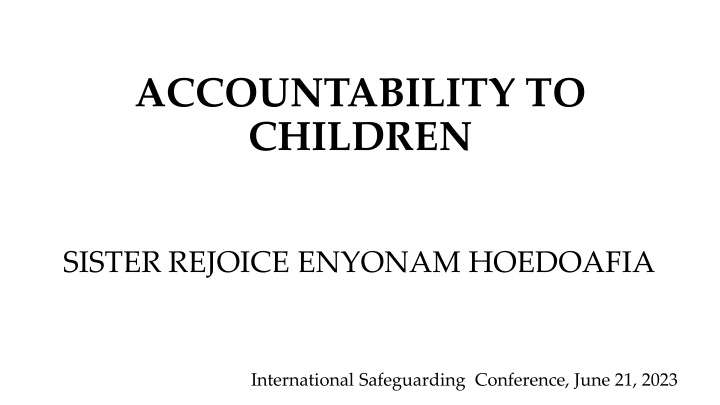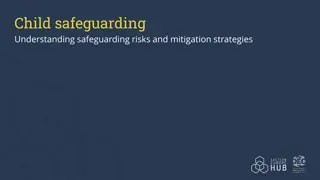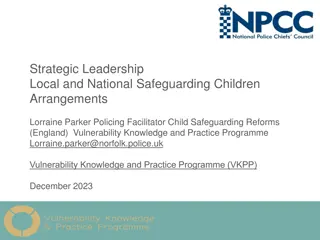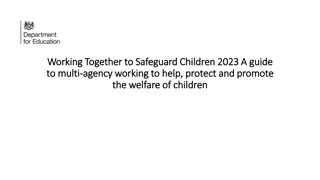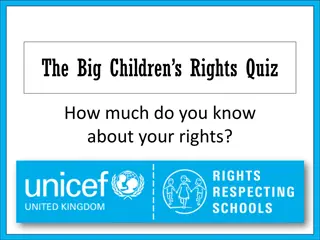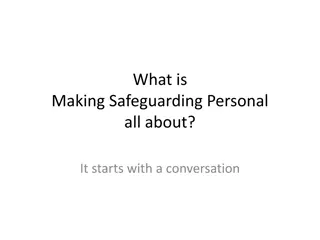Enhancing Accountability to Children: Safeguarding Their Rights
Recognizing the importance of accountability to children, this conference delves into the roles of various stakeholders in safeguarding children's well-being, addressing barriers, and proposing recommendations. Emphasizing the universal right of children to protection from violence and exploitation, the event aims to empower individuals and organizations to advocate for children's rights.
Download Presentation

Please find below an Image/Link to download the presentation.
The content on the website is provided AS IS for your information and personal use only. It may not be sold, licensed, or shared on other websites without obtaining consent from the author.If you encounter any issues during the download, it is possible that the publisher has removed the file from their server.
You are allowed to download the files provided on this website for personal or commercial use, subject to the condition that they are used lawfully. All files are the property of their respective owners.
The content on the website is provided AS IS for your information and personal use only. It may not be sold, licensed, or shared on other websites without obtaining consent from the author.
E N D
Presentation Transcript
ACCOUNTABILITY TO CHILDREN SISTER REJOICE ENYONAM HOEDOAFIA International Safeguarding Conference, June 21, 2023
Agenda Introduction Rationale for accountability to children The role of the laity in accountability to children Barriers to Accountability to Children Efforts to Address the barriers to accountability to children Conclusion : Recommendations
Introduction Everybody has a responsibility to keep others safe especially children and the vulnerable. If one is in contact with child who may be vulnerable, it is his/her duty to recognize, record, respond and report any safeguarding concerns. This includes caregivers, doctors, pastors, religious, teachers, social workers, friends, relatives and colleagues.
A Child A Child is a person who is below the age of 18. Majority is set at 18 years unless under domestic law, it is attained earlier. Children are individuals who are still largely dependent on an adult for the necessaries of life In most societies, children are perceived as different from adults, although how they are different and what that difference means varies with each culture and social environment.
Children Children have an inherent and universal right to a life free from violence, abuse, exploitation and neglect, and to survival and development. Yet today, more than 1 billion children about half the world s children experience violence every year.
Children Governments are responsible for ensuring children s right to protection against violence. Non governmental organizations, faith based organizations and all citizens including children, must be able to hold their parents, governments and duty bearers accountable to their protection obligations . Unfortunately in most parts of the world, children do not have regular access to a meaningful accountability mechanism. They have no voice, no platform and no access to recourse, and are not meaningfully engaged in decisions that affect their protection
Children In spite of the current survivor-affirming awareness around sexual violence around the globe, child sexual abuse, most notably when it s a family member or friend, is still a very taboo topic. There are millions child sexual abuse survivors and millions of bystanders who look the other way as the abuse occurs and cover for the harm-doers with no accountability. The need to be interested in the concerns of children far and near me.
What is Accountability Accountability is a social value that accesses and measures the depths of one s responsibility. It continuously evaluates the success with which it measures up its responsibilities. In the event of a failure, accepting full responsibility for defeat and does not seek to transfer the blame on others. It is the courage to accept and own mistakes without trying or hunting for justifications. The experience, either real or perceived of being held responsible for what one says or does.
What is Accountability Accountability enables us to adopt measures to strengthen the weakest links and complete the task entrusted to us with responsibility. It also has the potential to dispel doubts, fears, and suspicion. Accountability is careful and diligent in the discharge of its duties. It generates trust and confidence and proves one s trustworthiness. It boosts confidence, and reassures as people admire those who are accountable. Accountability paves the way for greater responsibilities and gives a sense of fulfilment and satisfaction
Accountability to Children Accountability to children is an important aspect of safeguarding, as it ensures that children and young people s rights, needs, and welfare are at the forefront of all safeguarding efforts. Accountability involves being responsible for one s actions and decisions, and being transparent and responsive to feedback and concerns from children and young people. Accountability to children in safeguarding is essential to ensure that their voices are heard, their rights are respected, and their safety and well-being are protected.
Accountability to Children Accountability to children in the context of safeguarding means: Ensuring that children and young people are informed about their rights and how to report concerns about their safety and well-being. Providing opportunities for children and young people to express their views and participate in decisions that affect them, including in the design and delivery of safeguarding services.
Accountability to Children Establishing clear lines of communication and mechanisms for feedback and complaints, and responding promptly and appropriately to concerns and complaints raised by children and young people. Regularly monitoring and evaluating safeguarding practices and outcomes, and making changes as needed to improve the effectiveness of safeguarding efforts. Holding individuals and organizations accountable for any harm caused to children and young people, and taking appropriate action to prevent future harm.
Proverbs about accountability to children African Proverb: "It takes a village to raise a child. Meaning: Children are the responsibility of the entire community, and everyone plays a role in their upbringing and well-being. Arabic Proverb: "Teach your children swimming and they will know how to save themselves when they fall into water." Meaning: Preparing children with important skills and knowledge will empower them to overcome challenges or difficult situations.
Proverbs about Accountability to Children French Proverb: "Childhood shows the man, as morning shows the day. Meaning: A person's character and qualities can often be observed in their early years, indicating their future path. Irish Proverb: "A child's life is like a piece of paper on which every passerby leaves a mark. Meaning: Every interaction and experience a child has shapes their development and character.
Rationale For Accountability To Children Protection and Safety Prevention and Awareness Justice and Redress Restoration and Rehabilitation Deterrence Ethical and Moral Imperative Empowerment and Validation
The Role of the Laity in Accountability to Children Importance of lay involvement in dealing with safeguarding concerns Encouraging vigilance in identifying and reporting abuse Working with clergy and religious to create safe environments Formative support for parenting children
Teaching Children About Personal Accountability Teaching and modelling accountability to children will empower them to learn to take persona responsibility for their actions. We need to do this with love, story telling , structure and guidance. This may be helpful in the cultural and systemic changes we all wish to see in our church and society at large.
Barriers to Accountability to Children Individual Factors Relational Factors Social Factors 1. Lack of awareness 1. Unequal power dynamics within relationships 1. Social stigma and norms surrounding abuse 2. Fear and intimidation 2. Lack of Awareness and Resources 2. Trust and Dependence. 3. Violence and dysfunction in the family 4. Lack of Supportive Relationships 3. Internalization of Shame and Guilt 3. Inadequate Legal and Social Protection services
Barriers to Accountability to children in the Catholic Church Protection the reputation of the church The Church's internal policies have sometimes discouraged reporting cases of child abuse to law enforcement agencies The lack of impartiality and transparency in internal investigations. The influence of clericalism The lack of independent oversight bodies or external review mechanisms
Efforts of the Church to Address the Barriers Creation of safe environments for children Moral obligation to protect children Reporting concerns or suspicions of abuse Willingness to listen and provide support for victims. Holding perpetrators accountable
Efforts of the Church to Address the Barriers Implementing stronger child protection policies. Cooperating with civil authorities. Formation and ongoing formation of priest and religious to be accountable. Scriptural Basis for Accountability to Children. Involving and training children Nonetheless, the ongoing challenge lies in ensuring that these measures are consistently implemented. The Church takes a proactive approach to prevent and respond to child abuse, placing the welfare of children above all else.
Some Recommendations Self-reflection and examination of conscience for all Cultural and system change in attitude and behavior Empowerment and Support Child Participation Child-Friendly Information Clear Reporting Channels
Some Recommendations Confidentiality and Privacy Child Advocacy Child Safeguarding Policies Training and Education Regular Reviews and Evaluation Continuous Learning / ongoing formation Research and surveys to sustain accountability
CONCLUSION In conclusion accountability to children requires a multifaceted approach as the child abuse is complex. By prioritizing the well-being of children and taking steps to prevent abuse, children, families, organizations and the state can demonstrate their commitment to accountability by helping to ensure that children are protected from harm By creating a culture of safety and accountability that prioritizes the well-being of children.
